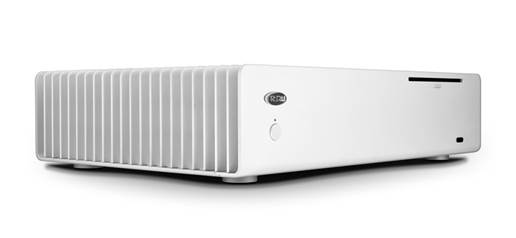With its new MCRU, Mains Cables R Us
has launched a full blown music server, but can we interface with it
successfully?
I blame the magazine. When I joined Hi-Fi
Choice all those hundreds of year ago, there was one computer in the office. It
was an Apple Macintosh II and as there was nothing else around that was what I
learned to use. As a result I have stuck with Cupertino’s biggest brand ever
since and have had only brief dalliances with rival Windows operating systems…
So when the MCRU Music Server came along,
with the now ubiquitous Windows 8 onboard, the learning curve was steeper for
me than most. Although judging from what long term PC users have been saying,
this latest variation on the Windows theme has not been absolutely universally
acclaimed…
According to the company which has
shortened the product-specific name Mains Cables R Us to MCRU, presumably with
products like this new Music Server in mind, Windows 8 is a better sounding OS
than its predecessor. And in truth it didn’t take long to get it up and running
once the initial ‘why won’t it work with the DAC?’ barrier was surmounted.

Mains
Cables R US MCRU Music Server
In essence, the MCRU Music Server is a PC
that has been built with the specific intention of getting the best sound that
a computer can deliver. It came about when MCRU’s David Brook heard about a
dedicated audio computer that had been built by Gary Jamieson, and discovered
the sonic potential of the approach. Gary is a computer engineer who had cherry
picked components for best sound quality to create his own server, albeit
within a budget that Brook decided could be increased if the results were
worthwhile. Gary describes the MCR Music Server as the “best bang for buck”
builds that he could come up with.
It features a very nice bit of aluminum
casework that contains a 64GB solid-state drive. This is a relatively small
thing by the standards of 2013 of course, but many will still find it ample and
you can choose a larger alternative if required, or keep more music on an
external NAS drive which is something a great many computer audiophiles do. The
SSD, like many aspects of this device can be specced according to requirements,
and as with any high end PC there is very little that cannot be customized in a
way that suits the user. Without wishing to stray into computer platform
politics, that’s the beauty of Windows…
Anyway, what Gary has done is to select a
motherboard and CPU specifically. The main power supply is an external brick,
not unlike that found on a Naim UnitiServe, and while a switching type is
supplied as standard there are two upgrade options, with the most expensive
being a linear type ($900). This is both a customizable and upgradeable digital
source, it is also a disc ripper, hence the slot.
The unit that I received had MCRU’s USB
output which has a power line noise filter, ultra-low clock jitter and
switchable USB power – the better DACs do not need the five volts in a USB
connection. To my knowledge it’s the first dedicated digital source to offer a
USB only output. The standard server ($2,325) has a 24-bit/192kHz onboard DAC
with a coaxial S/PDIF digital out, but MCRU doesn’t seem all that keen on that
digital audio standard.
The other thing that this company can do,
with which only the hardcore computer audiophile will be familiar is to
optimize the set0up of both the operating system and the playback software.
MCRU has chosen to use JRiver software, this is a highly customizable player
that will only give of its best when it has been set up with the minimum of
compromise for the given operating system.

MCRU
has chosen to use JRiver software, this is a highly customizable player that
will only give of its best
Booting up
In functional terms the server has all the
connections you would expect of a PC, including RJ45 for Ethernet connection
and NAS drives plus USB ports for external hard drives. There are also
connections for a screen, keyboard and mouse, which while not essential for
everyday use are necessary for making playlists, adding/deleting material etc.
there are apps for iOS and Android which can be used to drive the player in
normal use and even a remote handset in the box.
One thing that MCRU recommends however is
that you run Fidelizer every time you switch the server on and this has to be
done with mouse, I guess you could let the system sleep when not in use to
avoid this. As my initial comments indicate, my first attempts at running it
were hampered by an unfamiliarity with Windows, but once I had established that
the Metrum Hex DAC does not yet have a 64-bit Win 8 compatible driver, I was
able to move on and hook up both my Resolution Audio Cantata and a CAD 1543 DAC
for the listening.

The
MCRU Music Server proves computer audio is a force to be reckoned with at the
very highest level
I used both keyboard, mouse and monitor and
the Gixmo app on an Android phone to drive the player and found JRiver to be
reasonably intuitive if occasionally frustrating, and not always totally
stable, Still, there’s always the faint possibility that operator error may
have been a factor here.
The MCRU Music Server proves computer
audio is a force to be reckoned with at the very highest level…